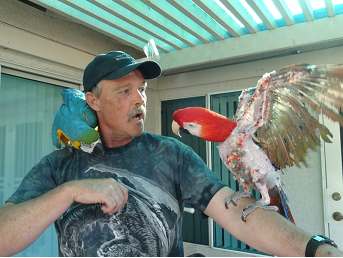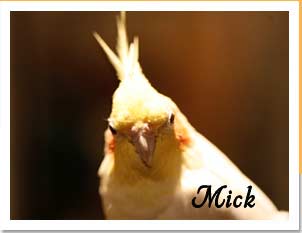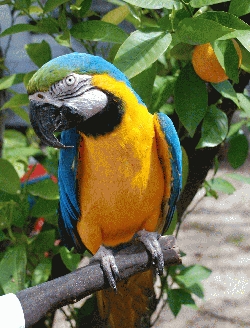Macaw Love Puts ‘Umph’ in Scott’s Triumph
By Vaishali Kirpekar
Scott Shipley has been patiently working with a foster macaw for the past two years and has made great strides. Scott Shipley, age 47, former Air Force medic, macaw coordinator, husband, and father of a 24-year-old is also a foster dad to King, a Scarlet Macaw. |
 |
In 2008, seven-year-old King joined the Shipley household of three terrier mix dogs Demi, Bridget and Jaya, a cat named Thea, his macaw Paco and cockatoo Gracie (both non-Mickaboo birds).
King was very plucked, had lived without any toys, and had been confined to a tiny space. Scott owned a macaw but had no experience in training a bird and modifying its behavior. He took the plunge into the world of rescued macaws and decided to equip himself with knowledge (and lots of walnuts).
Scott got good support and information from Mickaboo. He took an advanced bird behavior class where King was evaluated and Scott learned about managing biting behavior. A technique called “fade away” was used to teach the bird to bite appropriate objects. “If you get bitten by a macaw push in and downward motion to release yourself, otherwise skin could come off,” he cautions.
Initially, King was scared and “angry to death,” said Scott. “If you put your hand in his cage, he would try to take your finger off.” Walnuts in shells and almond slivers served well to please and befriend King. When the sun rose and King woke up, Scott offered him nuts immediately. Scott suggests, “Treats never go wrong, especially with macaws. But remember to give it in small bits otherwise holding the big ones gets them distracted.”
Trust was slow to come but Scott is not a quitter. He was ready to work on King using positive reinforcement no matter what happened. Once when Scott had King on his arm, teaching him to step up, King lost his balance and grabbed Scott’s cheek to right himself. Scott’s resulting wound landed him in the emergency room! “My feeling was ‘Oh my god,’” Scott remembers. The pain had not settled in then. It took six weeks to recover with antibiotics. Scott is quick to add that the wound was not King’s fault. “I was pushing him too hard too soon.”
Scott was eager and patient in working with this bird. Gradually he taught King the Get In command and to step up on a stick as well as an arm. After two years of this journey, one night when the family was watching television, King climbed up on his wife’s arm and whispered ‘love you, love you’ in not only the sweetest voice but with sweet intentions too. Scott says, “I was just ecstatic and I thought my wife was very brave. I was just so happy that King was willing to show his trust. Every bird is an individual but the thing is to never give up hope.”
Also he says being aware of what changes your bird’s behavior is very important. “Observe, study your bird.” Scott would observe King, sitting in King’s room an hour at a time near his cage and talking to him.
Before King arrived in his life, Scott had a bird (Paco). His wife loved macaws and he bought a Blue and Gold Macaw when they lived in Mississippi eight years ago as a birthday gift for her. “We bought Paco from a pet store and we were just not given any information about diet, positive training etc.”
Scott admits that until then he had been a dog and cat person. He also chuckles, “Paco bonded with ME!” Since then, people who know him know that he is also a bird person. Scott also has a special knack for rescuing birds. For example, there was a cockatoo that escaped and perched high into a tree, refusing to come down, who surrendered to Scott when Scott offered him a bag of treats.
Scott continues to work with King. “If I turned away, stopped interacting and walked away when things didn’t work out, that is what King would have wanted.” King has progressed to the point where he will sometimes tolerate scritches. King loves to chat too. Scott adds, “He has an incredible vocabulary and says ‘I love you, King is a good boy, what is going on in here?’” Scott adds that King is still not too comfortable to be a part of the house. “We have to be careful, slow and give him time to sink in.”
Scott is working on King’s lunging behavior. Earlier King would draw blood but now he ends up making holes in shirts. Scott says the bad side is, “I don’t have many shirts without holes.” Scott hopes to get King to a point where Scott could have an intact shirt (without a hole from King) for a week.
Scott emphasizes that many of the older birds (even some young ones) who come to Mickaboo have some baggage, but it’s rarely something that cannot be overcome with time, patience and love. “Some of our older macaws have plucking problems that initially turn people off too, but these bald birds are beautiful in their own right and usually have great personalities. Also older macaws tend to be mellower. It is kind of like they mature a bit. They have to go through adolescence like human kids.”
And indeed King behaves like a child. “Now he hangs out with the other birds, but he does not interact with them,” Scott says. He gets mad if they get too close or don't get out of way fast enough. Despite that, he does not like to be left alone. If Paco or Gracie get down and leave the room, he tattles on them.
Scott is finishing coursework in an Information Technology program. He is away four to six hours a day, four times a week. But he always finds time to train King and take him to Mickaboo’s adoption fairs. At the fairs, people frequently ask questions about King’s plucked body. Scott teaches them that plucking is not a disease and that King is an otherwise healthy bird who (before coming to Mickaboo) was not given the toys and interaction that birds need so much.
Scott says he has seen both the good and the bad in his life. The best part of his career was being stationed in Queensland, England for seven years. Now it is King’s progress that has filled his heart with triumph. King, a grouchy old guy in the morning, a sucker for walnuts, an old hand at adoption fairs—now does tricks too, waving his wing and nodding his head.
On the whole, Scott is happy that he, along with the rest of the Mickaboo macaw coordinator team, can make a difference in the lives of these big birds and help them find suitable homes.

